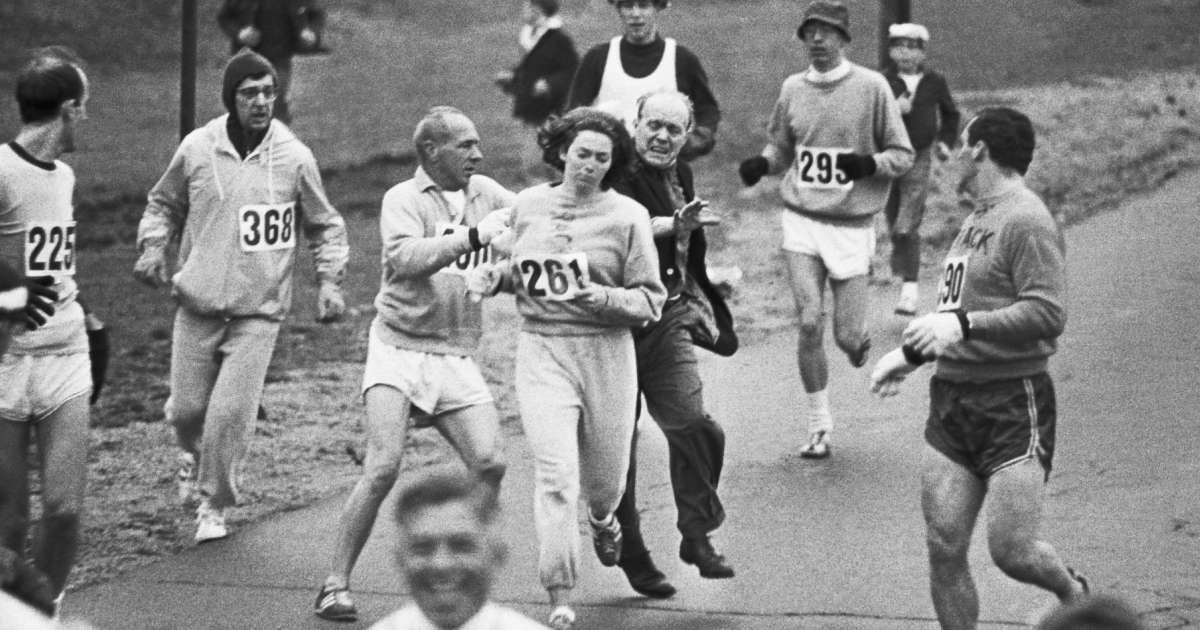Why are feminists advocating that trans women should not be allowed to participate in women's sports?
Women and men do not have the same physical capacities: this influences their sports performances. Regularly, men who declare themselves women invite themselves on the female podiums. Focus on this entryism that revolts feminists.
Trans women are in fact men, or more precisely, males who call themselves women. If this is not clear to you, we invite you to consult the lexicon Femelliste.
So after this quick insight, the question deserves to be rephrased, "Why do some feminists advocate that MEN should not be allowed to compete in women's sports?" And the answer is a no-brainer: "Because they're feminists of all things!" Our article could have ended there, but we're going to make the effort to expand on it a bit anyway.
Women and men have different physical abilities, and this affects their athletic performance. At the time of writing, the women's 100m record is held by Jamaica's Florence Griffith-Joyner, with a time of 10 seconds 49 seconds. The men's 100m record is held by Jamaica's Usain Bolt, with a time of 9 seconds 58. The gap is almost 1 second, that is to say almost 10% of the total time of the race, and reflects the average gap between male and female athletes found in the final of the 100m. Indeed, the feat for the women is to pass under the 11-second mark; for the men, under 10 seconds.
The 100m discipline is no exception:
In pole vaulting, the women's world record is held by the Russian Yelena Isinbayeva, with a vault of 5.06m; the men's world record is held by the Swede Armand Duplantis with a vault of 6.21m;
in long jump, the women's world record is held by the Russian Galina Chistyakova, with a jump of 7.52m; the men's record is held by the American Mike Powell, with a jump of 8.95m;
In shot put, the women's world record is held by the Russian Natalya Lisovskaya, with a distance of 22.63m; the men's record is held by the American Ryan Crouser, with a distance of 23.37m;
In the 50 km walk, the women's world record is held by Liu Hong of China, with a time of 3h 59min 15s; the men's world record is held by Yohann Diniz of France , in 3h 32min 33s.
We could go on and on with this list, since in all athletic disciplines (we take this example because the performances are very easily measurable and comparable), men outperform women. Generally speaking, in sports that require a high level of cardiac, muscular and pulmonary activity, men's performance is 10% higher than women's. Serena Williams herself says that she would lose "6-0, 6-0 in five minutes to Andy Murray".
Nevertheless, in sports such as synchronized swimming, figure skating or gymnastics, which are less socially valued, women's performances exceed those of men because their ligaments allow for more flexibility.
So why does this question persist despite the obvious answer we can provide with some statistics? The answer is just as simple: because "trans women males" are colonizing women's sports competitions and even stealing their places on the podium from women who have been training for years.
For example, Lia Thomas, a transgender "swimmer," won the women's 500-yard - or 457-meter - freestyle final at the Ivy League college championships in Atlanta on March 17, 2022.
Trans-identified swimmer Lia Thomas on the women's podium at the Ivy League college championship in Atlanta on March 17, 2022.
This photo, which has been around the world, does not require any comment. We simply ask you to look at it and wonder about what you see.
Lia Thomas' case is unfortunately not an exception. Many other trans-identified males are winning female sports competitions: Laurel Hubbard, a "trans woman" male weightlifter named "New Zealand Sportswoman of the Year" by the University of Otago after winning a title; Veronica Ivy (cyclist) having won the "2018 UCI World Masters Track Cycling Championships" in the women's category in 2018; Lana Lawless having won the "Long Drivers of America" (gulf) competition in 2008; Kate Weatherly, male cyclist having won two national titles in the women's category, and the list goes on and on(a preview here).
We never hear about the women who colonize the male podiums; although they currently represent 75% of gender transitions, they have no interest in competing against males: they would lose every time.
What about women?
Women and collectives like Save Women's Sports are standing up against the assault by some men on women's podiums.
For now, few sportswomen dare to criticize this threat to their rights because they are immediately accused of "transphobia" or of being "TERFs". This is what happened to Martina Navratilova, tennis champion, who had claimed at the end of 2021 that trans women were "cheaters" and "men who decided to become women", before also declaring "So I'm a 'TERF' - OK, right?", in response to the many accusations. Under pressure, Navratilova had finally apologized a month later for using the word "cheater", assuring that she would be to find a compromise...
So, despite the consequences, why do women persist in defending non-mixed sports competitions? To understand it, it is enough to throw a fast glance back. In 1896, during the first Olympic Games of the modern era, there is no woman. In 1900, during the Olympic Games of Paris, which take place within the framework of the universal exhibition, the women are authorized for the first time to compete in some disciplines, like the horsemanship, the golf, or the tennis. In 1996, less than thirty years ago, at the Atlanta Olympic Games, only 97 of the 271 events were open to women, and out of 10,629 athletes, only 3,626 were women.
Today, disciplines such as Greco-Roman wrestling and Nordic combined remain exclusively male; others, such as synchronized swimming (entered in the 1984 Olympics) or rhythmic and sports gymnastics, are exclusively female.
Women have had to fight for the right to compete in official sports events, including Kathrine Switzer, a marathon runner famous for starting the Boston Marathon on April 19, 1967 with bib number 261, the only woman in a crowd of men. At the sixth kilometer, her presence was noticed by journalists and organizers. One of them tried to stop her, but her coach and spouse intervened. She finished the race with a time of about 4 hours 20 minutes, an hour faster than the time of Roberta Gibb, who was not registered the previous year.
Kathrine Switzer will dedicate the rest of her life to fighting for women's access to sports facilities and competitions, and will become an important figure in the promotion of women's emancipation through sports.
The practice of sports is a source of emancipation and well-being for every human being. Women had to fight to have their own competitions, and this represents an important achievement for feminism.
Kathrine Switzer at the 1967 Boston Marathon.

